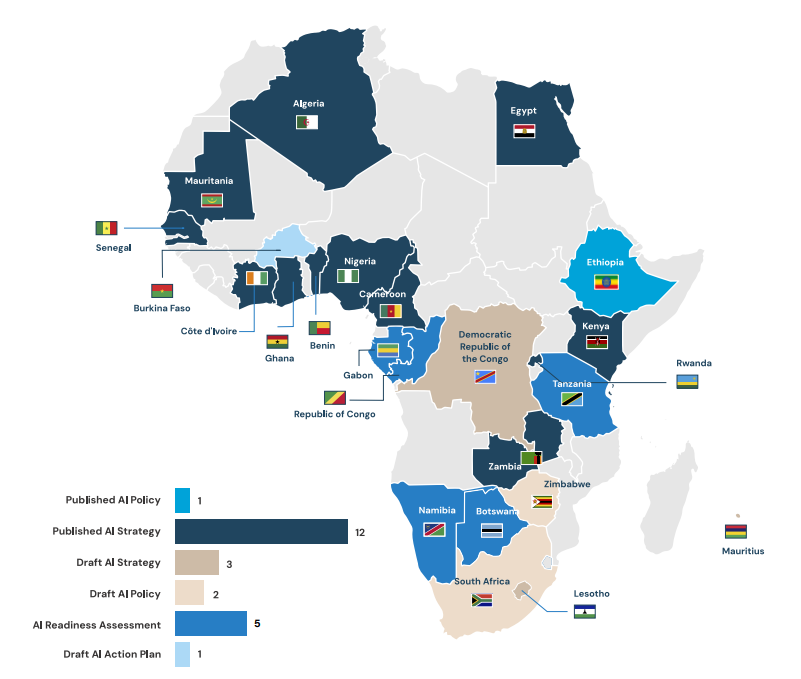Introduction
Our recent State of AI Policy in Africa report explores how 24 African countries are approaching the AI transformation, revealing what progress has been made and where the gaps remain.
Among these African countries examined, only 13 now have official AI frameworks – one national policy and 12 published AI strategies – while others are still drafting theirs.
But beyond the numbers, the report tells a bigger story: one of opportunity, ambition, and the urgent need for action.

Mapping the Policy Landscape
Today, 13 African countries out of 24 examined have made tangible progress in this space. Egypt, Algeria and Ethiopia are leading the pack with developed and implemented national AI strategies. Kenya and Senegal stand out for scale and financing for its cost rollout plan. Mauritius and Ghana show policy continuity while Nigeria demonstrates strong participation and implementation through local language models.
Zambia with its smaller economy still achieved meaningful progress with its early rollout while Namibia, Botswana, and Zimbabwe are still in the drafting stage. Other African countries in the drafting stage of their AI policies are Gabon, Tanzania, Mauritania, Burkina Faso, Republic of Congo and Democratic Republic of Congo.
However, Benin, Cameroon, and Rwanda have successfully published AI strategies while Côte d’Ivoire officially entered the AI policy space in March 2025.
It’s an uneven yet encouraging landscape that mirrors Africa’s broader development journey of being bold, complex, and deeply intentional.
While some nations sprint ahead, others are taking cautious, steady steps. However, they all share the same goal of shaping an AI future that reflects African realities.
Why Africa Is Investing in AI Now
Africa’s governments are realising that AI isn’t just about technology, but about transformation.
From agriculture and healthcare to education and public administration, AI offers a way to solve long-standing challenges at scale and do it faster, smarter, and more efficiently.
Across many African capitals, policymakers see AI as the bridge between population growth and economic opportunity. With over 60% of the continent’s population under 25, Africa is the world’s youngest continent. The need for jobs, innovation, and digital literacy has never been greater, and AI presents a chance to equip young people for the future of work.
Countries like Nigeria and Kenya are using AI to reduce dependence on oil and agriculture by building data-driven economies while Rwanda and South Africa are automating administrative processes to improve service delivery and reduce corruption.
For Africa, the AI conversation is about ensuring the continent’s future is powered by systems that understand its languages, respect its data, and solve its problems.
Challenges and Gaps in AI Governance
The State of AI Policy in Africa 2025 report has highlighted that only a few nations have established clear ethical and legal frameworks to guide how AI should be used across sectors. Most are still grappling with questions around data privacy, transparency, and accountability.
The biggest challenges identified are:
- Weak institutional capacity: Many countries lack specialised agencies or experts to oversee AI implementation and enforcement.
- Data scarcity and poor infrastructure: Reliable, quality data remains limited across sectors like health, agriculture, and governance — making it difficult to train accurate AI systems.
- Limited funding for research and innovation: AI development is often dependent on foreign grants and partnerships, which can influence local priorities.
- Ethical and social risks: There’s little guidance on how to address bias, discrimination, exploitation, or surveillance concerns in AI systems and ecosystems.
- Fragmented policy coordination: Ministries, private sectors, and academia often work in silos, slowing down national strategy alignment.
The Road Ahead
Africa’s AI journey has clearly begun, but its true success will depend on closing the gap between ambition and action. The next phase is all about bringing existing ones to life. That means embedding AI strategies into law, not leaving them as policy drafts.
It also means building strong public institutions and ethical frameworks that go beyond government ministries. They can include universities, civil society, and the private sector. It will require regional and continental funding mechanisms to ensure that AI investments are sustainable, not short-term pilot projects.
Just as importantly, countries need to make progress transparent by allowing independent verification and public accountability to guide every step forward.
For a deeper view into the data, insights, and country-specific details shaping this transformation, explore the full State of AI Policy in Africa 2025 report for a comprehensive look at where the continent stands and where it’s headed next.





